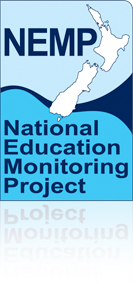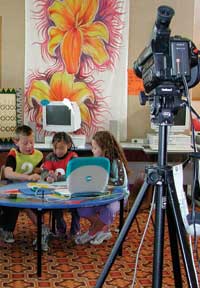|
FOCUS / FORUM
INDEX
|
 |
In 2008, the Forum Comment,
was relaunched as the Focus
reflecting the closer comment from
NEMP and the panel of educators. |
 |
|
Main Index for Focus / Forum
Introduction
to Focus / Forum
He
Whakaputanga Whakaaro –
Introduction for Mäori
Medium forums
|
| Forums by year of assessment |
|
|
|
Science
Art
Graphs, Tables & Maps
|
|
|
|
Music
Aspects of Technology
Reading & Speaking |
|
|
|
Information
Skills
Social Studies
Mathematics |
|
 |
|
Listening
& Viewing
Health & Phys. Ed.
Writing |
|
| Forums for Mäori Medium |
|
|
|
Science
Art
Graphs, Tables & Maps
|
|
|
|
Music
Aspects of Technology
Reading & Speaking |
|
|
|
Information
Skills
Social Studies
Mathematics |
|
 |
|
Listening
& Viewing
Health & Phys. Ed.
Writing |
|
|
|
|
|
 |
|
 |
|
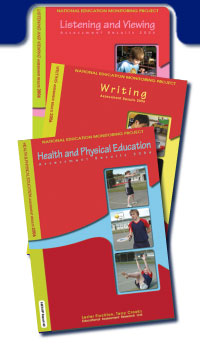
CLICK
on reports above to go directly
to comments |
|
2007
FORUM
PARTICIPANTS
Sandra Aikin
Merimeri Anania
Susan Apathy
Alistair Banks
Ally Bull
Lisette Burrows
Kate Collins
Ian Culpan
Stephanie Dix
Barbara Ferguson
Alison Gilmore
Brent Gray
Hadyn Green
Ray Griffiths
Rose Hague
Julie Hepburn
Mary Hill
Diane Legget
Libby Limbrick
Erin Moore
Jeana Packer
Faye Parkhill
Liz Patara
Jennifer Radford
Jamie Rowe
Heather Russell
Lorraine Stiles
Maria Tibble
Jackie Wells
Susan Young |
|
The
third four-year cycle of national monitoring started
in 2003. Results from this third cycle allow comparisons
with performances in the previous cycle of assessments.
The three reports on the 2006 assessment results were
considered by a national forum of teachers, subject specialists,
representatives of national organisations and government
agencies. Their comments highlight what students are
generally doing well, and those areas where improvements
are desirable.
The help of principals, teachers and Boards of Trustees
in making NEMP reports and this Forum Comment widely
known is encouraged and appreciated.
 |
Click
the Access Task icon for more information
about the tasks which will be available
to schools from November 2007. |
|
|
|
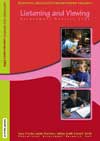 CLICK for
full report CLICK for
full report
|
GOOD
NEWS
• Year
4 and year 8 students maintained levels
of achievement from 2002 to 2006.
• Some worthwhile achievement
gains were made from year 4 to year
8.
• For
the most part, boys and girls performed
similarly. |
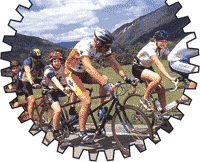 |
• In
general, students scored well on tasks involving
recall, using specific factual information or on
topics of interest (e.g. sports or exciting events).
|
 |
CONCERNS
• Students at both year levels were less successful
on tasks requiring critical analysis, interpretation, symbolic
representations, metaphor or evaluation.
• Students had difficulty with tasks involving
critical thinking to differentiate fact from opinion.
• There were significant gaps among ethnic subgroups,
especially pertaining to Pasifika students. This was particularly
the case in listening tasks. Additionally, Pasifika students
did not show the same improvement from year 4 to year 8
as Pakeha and Mäori students.
• Following an improvement in 2002, disparities
in performance between low and high decile schools grew
larger in 2006. This trend is not as pronounced for viewing
tasks.
|
LOOKING
AHEAD
• Because many of the instructional practices in
schools rely on effective and active listening, attention
needs to be paid to the teaching of listening skills and
the use of multi-modal forms of information presentation.
These practices will help ensure that students have equitable
access to the curriculum/learning.
• Because society relies increasingly on the use
of multi-media formats for presenting information, specific
attention needs to be paid to developing skills in relation
to these media. This may be facilitated most readily by
using familiar contexts and experiences, and building on
students’ prior knowledge.
• Particular attention needs to be paid to developing
the higher order skills of interpretation, analysis, figurative
interpretations and evaluation. This is particularly urgent
for Pasifika and Mäori students.
|
|
|
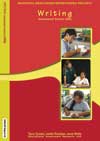 CLICK for
full report CLICK for
full report
|
GOOD
NEWS
• In expressive writing, there was substantial
improvement from 2002 for year 4 students, and a
modest improvement for year 8 students.
• Writing stories was the most popular school
writing activity for year 4 and year 8 students.
Writing poems and letters, and writing in other school
subjects were also quite popular among students. |
|
• There
have been reduced disparities from 2002 to 2006 in overall
scores between Pakeha and Mäori students, and between
Pakeha and Pasifika students.
• Disparities between performances of students in high,
medium and low decile schools have reduced from 2002 to 2006.
• The percentage of year 4 students who reported enjoyment
from writing in their own time has increased from 1998 through
to 2006.
• Differences in achievement between Pakeha and Mäori
were smaller at year 8 than year 4, suggesting a trend towards
improvement for Mäori students as they advance from
year 4 to year 8.
• Pasifika students were more enthusiastic about writing
and sharing their work with others than Pakeha and Mäori. |
|
 |
CONCERNS
• Although there was improvement in most areas
of expressive writing, there is still room for improving
richness of writing and attention to detail.
• Boys continue to achieve at lower levels
than girls. They performed less well on approximately
50 percent of tasks at year 4, and 70 percent of tasks
year 8. This is a serious concern, with the gap larger
than in all other areas assessed in NEMP.
• Despite the overall reduction in disparity
between Pakeha and Pasifika students, Pasifika students
are still achieving at substantially lower levels at
both year 4 and year 8. This was especially noticeably
in persuasive writing and use of punctuation.
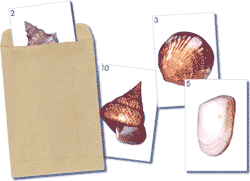
• There
was no improvement in use of writing conventions
(spelling, punctuation, grammar), despite overall
gains in writing.
• Many students did not appear to understand
the conventions and layout of formal or business
letters, such as including the recipient’s
and sender’s address, appropriate salutation
and the date.
• When invited to edit their writing, students
paid most attention to spelling and punctuation but
paid little attention to paragraphing, reorganising
or extending their writing. |
LOOKING
AHEAD
• Help students to always clarify the purpose
and appropriate style for each piece of writing in
which they engage.
• Strengthen the planning phase of story writing,
including attention to purpose, audience, coherent
themes and strong conclusions.
• Help students to understand and use the principles
and skills of proofreading and editing their writing.
• Provide models, instruction, practice and
feedback in using correct formats for formal letter
writing.
• Provide
students with opportunities to use technologies
and software that connect with social and cultural
interests (e.g. blogging and adapting texts to
different purposes and audiences).
• Work to lift achievement gains in functional
writing so that they are more in line with the
progress between 2002 and 2006 shown by both year
4 and year 8 students in expressive writing.
• Take steps to identify and address the
reasons for declining interest and less positive
attitudes towards writing by many year 8 students.
• Teachers might seek and use feedback
from students on their writing attitudes and perceptions,
using questionnaire approaches similar to the NEMP
survey. (Note that blank versions of NEMP surveys
are available on the website.) |
|
HEALTH & PHYSICAL
EDUCATION 2006 |
 |
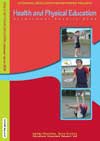 CLICK for
full report CLICK for
full report
|
GOOD
NEWS
• Despite popular perception that engagement
in physical activity is declining, physical
education is the second most favoured subject
at year 4 and favourite at year 8.
• Students showed improved knowledge
of physical health consequences of smoking,
alcohol, nutrition choices, stereotyping, shared
drink bottles, and hand-washing.
|
• There
was marked improvement (especially at year
4) on understanding the constituents of a ‘healthy’ school
lunch.
• Year 4 and year 8 students have a
reasonably sound grasp on how to deal with
bullying. Most said they would engage the help
of a teacher
and/or parent and many felt that they could
talk with the bully and explain how they felt.
|
|
• There
was less evidence of students showing gender stereotypes
at year 4 compared to the 2002 results.
• Both year 4 and year 8 students scored extremely
well on the task “New Kids at School”.
• Mäori and Pasifika students scored higher
than Pakeha students on culturally relevant movement
tasks like poi.
• Progress has been made in reducing disparities
in achievement between Mäori and Pasifika students
and Pakeha students, with Mäori students scoring
slightly higher than Pakeha on physical education
tasks. |
 |
CONCERNS
• Health was rated the lowest subject preference
by both year 4 and year 8 students.
• There was a lack of understanding of
social, emotional and spiritual aspects of well-being/hauora.
• The least liked health activity for both
year 4 and year 8 students was “my feelings
and how to feel good about myself”.
• There was a low preference at year 8
for swimming despite widespread concern about
New Zealand children’s aquatic safety.
• Year 4 students showed minimal understanding
of the benefits of food beyond the ‘physical’.
• Te reo kori continues to be the least
preferred physical education activity.
• While the feedback from teachers to children
about their ability in physical education has
improved, many students said they do not know
what their teacher thinks of their ability in
health education.
• Boys continue to out-perform girls on
motor tasks that are often emphasised in school
based physical education (e.g. throwing, kicking,
striking, small ball catch, distance throw, racquet
strike), while girls continue to score well on
tasks like balance and skipping.
• Many students have the perception that
health activities are only sometimes or never
done in class. |
LOOKING
AHEAD
• Broadening and balancing students’ understandings
of health so that mental, social, emotional and
spiritual well-being are valued as highly important
dimensions.
• Through suitable learning experiences,
continuing to emphasise that health is about
more than the ‘right’ food.
• Continuing to recognise and address the
impact of gender, ethnicity, location and class
on the kinds of activities valued and achieved
in by students (e.g. differences in boys’ and
girls’ performance on motor tasks; differences
between Mäori and Pakeha on poi tasks; and ‘poorer’ performance
of Pasifika students on personal health tasks).
• Exploring ways to make swimming a more
attractive proposition for year 8 students.
• Fostering of critical thinking and reflection
as essential skills for learning and progress
in health and physical education.
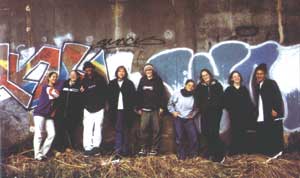
|
|
|
 |
GOOD
NEWS
• Overall,
the assessment results for Mäori students
were positive. The findings show only moderate
differences between Mäori and Pakeha students
at year 4, and an important decrease in this gap
by year 8. In particular, the percentage of students
scoring at the highest levels increases strongly
on many tasks from year 4 to year 8.
• The
pattern of strong growth in Mäori students
from year 4 to year 8 can be seen across
the board on tasks in expressive writing,
functional writing and writing conventions.
• Results from the NEMP survey showed
that more year 8 Mäori students than Pakeha
students said they wrote stories, poems or
letters at school.
• Mäori students perform far more
competently at year 8 than at year 4 on listening
and viewing tasks. The discrepancy between
Pakeha and Mäori students decreased
from year 4 to year 8.
• Overall on the physical education
tasks, Mäori students scored slightly
higher than Pakeha students.
• On the health tasks, the differences
between Mäori and Pakeha at year 8 remain
small.
|
|
|
CONCERNS
• In expressive writing, as with all other
students, Mäori students at years 4 and 8 found
the dimensions of clarity, richness and personal feeling
or humour challenging. |
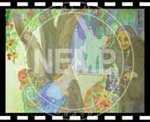 |
• On
listening tasks, Mäori students at year 4 did
not perform as well as Pakeha students as they did
four years ago. Furthermore, at year 8 there is little
change from 2002 to 2006.
• Compared to Pakeha students, there have been
no gains on viewing tasks by Mäori students at
year 4 and year 8 from 2002 to 2006.
|
| • As
with all other groups of students, Mäori students
are less successful on interpretation or inference,
interpreting messages or evaluating the merits of
opposing arguments in listening tasks. |
LOOKING
AHEAD
• The
advice offered under the sections Writing; Listening
and Viewing; and Health and Physical Education applies
equally for Mäori students.
|
|
 |
ISSN 1174-247X
|
|
|
COMMENTS
FROM FOCUS GROUPS |
 |
|
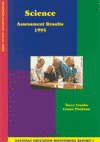 CLICK for
full report CLICK for
full report
|
SCIENCE
FOCUS GROUP
The assessment tasks have high validity in terms of
science education. They are largely practical. They
involved students in thinking and showing their understanding
of real rather than contrived situations.
Learning outcomes that are important for science learning
in New Zealand have been targeted. The tasks cover
a good cross section of the curriculum strands.
|
The
original data are so rich that they cannot be fully captured
in the reports. However, the reports give a snapshot
of important things that students know and can do well,
and those areas needing improvement.
Topics that are well understood by Year 4 and Year 8 students
include electric circuits and floating and sinking. Knowledge
of earth science was lower than other areas. Year 4 and
Year 8 students need to be encouraged to develop broader
ideas and understandings about environments such as river
estuaries.
Use of equipment, measurement and interpretation of results
are done well at both Year 4 and Year 8. The more sophisticated
ideas about ‘fair tests’ and checking results
by repeated measurements need emphasis in teaching and
learning. Some of the tasks showed that students need to
learn planning skills, particularly for open-ended investigations
and those done in group settings.
There is a clear advance in knowledge and skills from year
4 to year 8.
Girls view science less positively than boys and this is
reflected in lower achievement by girls at both Year 4
and especially Year 8. Continuing work is needed to reduce
this difference.
|
|
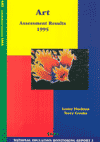 CLICK for
full report CLICK for
full report
|
ART
FOCUS GROUP
This report provides a very helpful national assessment
model for measuring student abilities across a wide range
of important art skills and knowledge.
From the data gathered and reported, we now have valuable
information to support qualitative judgements about student
achievement in art.
The results show that a majority of students enjoy participating
in art activities, and that there is some development
between Year 4 and Year 8. Overall, there is less growth
between years 4 and 8 than might be expected within this
essential learning area. |
New Zealand students are not doing so well in responding
to art, which is one of the two main strands of the art curriculum.
The whole area of artistic literacy requires special attention.
The report shows that students need help to be able to talk
with some knowledge and understand about examples of art
works and the relationships between art and culture. This
points to a focus for teacher development and the provision
of supporting resources.
We can celebrate the finding that factors such as race, gender,
school region, size or type appear to be unrelated to students’ achievements
in art.
The report reveals the challenge to build excellence in the
two key dimensions of an art education: making and knowing
about art. |
|
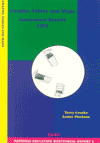 CLICK for
full report CLICK for
full report
|
GRAPHS,
TABLES and MAPS FOCUS GROUP
The essential skills of reading, constructing and interpreting
graphs, tables and maps cut across several curriculum
areas. The assessment tasks represent a wide range of
everyday information.
Special features of these tasks are that many have been
presented orally, in small groups and individually. Novel
approaches have made the tasks interesting and accessible
for students. The tasks have been administered in ways
that don’t disadvantage poor readers. |
About 90 percent of Year 8 students are able to complete
a bar graph and interpret a simple graph, an air timetable,
a floor plan, a flow chart and a table of figures.
The results tend to confirm the good achievements that New
Zealand students of a similar age scored in the 1990-91 international
reading literacy survey. By the end of primary school, most
New Zealand students have mastered the essential skills of
extracting and interpreting information from graphs, tables
and maps.
Year 8 students fount it somewhat more difficult when (i)
there were more than two operations involved; (ii) they were
asked to extrapolate or make a generalisation or identify
trends implicit in the information; (iii) the material contained
a large amount of information additional to the task, yet
typical of everyday material.
While students of Year 4 do well at these tasks there is
substantial growth in skills from Year 4 to Year 8. On average,
about 10 percent growth per year.
Although most students were able to construct graphs to illustrate
given data, their labelling of axes was often overlooked.
Student’s ability to read and air NZ timetable stood
out in particular.
New Zealand newspaper and magazine editors can have confidence
that most New Zealand adults of the future will be able to
interpret material presented in graphs, tables and maps. |
|
TEACHERS
SAY: Comments from the classroom teachers attending the forum |
 |
|
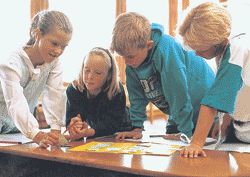 WHAT'S
SO GOOD ABOUT NEMP? WHAT'S
SO GOOD ABOUT NEMP?
• The project
gives credence to cultural and gender values.
• Teachers are involved in task development
• The tasks have undergone detailed trailing during their
development.
• Tasks are interesting. Students are motivated to do well.
• Tasks are practical and focus on important curriculum outcomes.
• The range of tasks gives a picture of a good cross section
of the curriculum.
What good things do the
reports show that are happening in our classrooms?
• There is clear evidence of growth in knowledge and skills
over the year 4 period.
• Parents can make choices of schools knowing that the type
of size of school is not likely to affect their children’s
education.
• Students responded well to the many practical tasks of
the kind that are advocated in the new curriculum.
What we need to do?
• Recognise the value and importance of National Monitoring
as it has been administered.
• Identify and acknowledge areas of concern for further and
future professional discussion and attention within our schools.
For example, the performance of girls in science, and students’ ability
to talk about art.
• Take particular note of the resource implications for achieving
educational standards.
• Accept that schools in socially or economically disadvantage
areas require special understanding, support and resources to help
them lift the performance of their students.
Credibility?
As classroom teachers, we trust these reports and national monitoring
because:
• There is high quality advisory input and expert leadership
of the project.
• All national curriculum subjects will be covered in a 4-year
period
– NEMP recognises a balanced curriculum for all students.
• The tasks reflect the important learning outcomes of national
curriculum.
• The assessments cover of a broad range of what we as teachers
and parents are wanting students to achieve.
• The tasks represent practical, hands-on learning.
• Tasks are interesting and motivating for boys and girls.
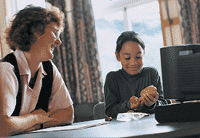 •
Enjoyment is understood as in important factor that contributes
to learning and success. •
Enjoyment is understood as in important factor that contributes
to learning and success.
• The tasks are carefully developed and tested before large
scale use.
• Video recorded interviewing helps standardise task administration
and marking.
• Low achieving students enjoyed the tasks.
• Students felt positive about being assessed.
• Co-operative group skills are assessed nationally for the
first time.
• NEMP values the work of teachers: assessment is carried
out by teachers and marked by teachers who are given special training
and guidance.
• This project gives teachers excellent opportunities for
professional development in curriculum related assessment.
• The reports give useful models for teachers to follow.
• The reports will help teachers to carefully review and
discuss some important aspects of learning.
• NEMP assessment gives schools procedures and data useful
for school-based self-review.
• The project offers a great chance for New Zealand to be
at the forefront in the world of assessment.
|
 |
|
|
|
 WHAT'S
SO GOOD ABOUT NEMP?
WHAT'S
SO GOOD ABOUT NEMP?  •
Enjoyment is understood as in important factor that contributes
to learning and success.
•
Enjoyment is understood as in important factor that contributes
to learning and success.